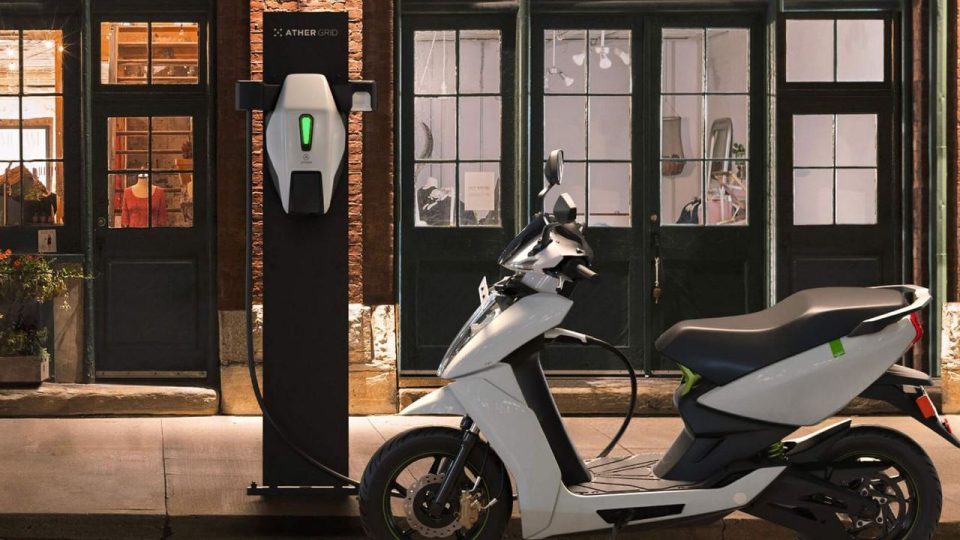
Fires just a flicker? Sales, hirings indicate EV sector is fully charged for growth
The strong demand growth is unmistakable, even as EV manufacturers review safety measures and work towards greater quality compliance

With the recent spate of fire incidents, criticism against the Indian electric vehicle (EV) industry has been mounting. It is pointed out that in a bid to reduce costs, battery safety is being compromised. That the industry players — particularly electric two-wheeler makers — are rushing into production to enjoy early-bird advantages. That the country’s regulatory ecosystem is unprepared to handle EVs. That customers are not adequately informed on how to maintain an EV.
However, these concerns and criticisms are doing little to dampen the EV sector’s growth plans. Two trends indicate that the industry players are pressing the pedal: one, the sales are blooming; two, hiring is on the rise. The strong demand growth is unmistakable, even as the manufacturers review safety measures and work towards greater quality compliance.
Also read: To remain on fast lane, India’s EV sector needs strong regulation
Sales accelerating
Data reveal that April 2022 had a total of 72,519 units of electric vehicles being sold, with electric two-wheelers (E2W) forming a major share with 49,141 units. While April 2022 did see a dip from March 2022, which saw sales of 77,128 total EVs and 49,591 E2Ws, it showed a vast improvement year-on-year, that is, over April 2021.
Two-wheelers (67%) and three-wheelers (28%) accounted for about 94 per cent of the total sales last month, followed by cars (3%) and buses (0.2%).
As many as 2,659 electric cars were sold in April, down 26% from March, but 345% higher than April 2021. Around 87 per cent of the electric car sales was led by Tata Motors, even as other companies such as BYD, Audi, and BMW saw an increase during the month.
Electric vehicle sales in India (April 2021-April 2022)
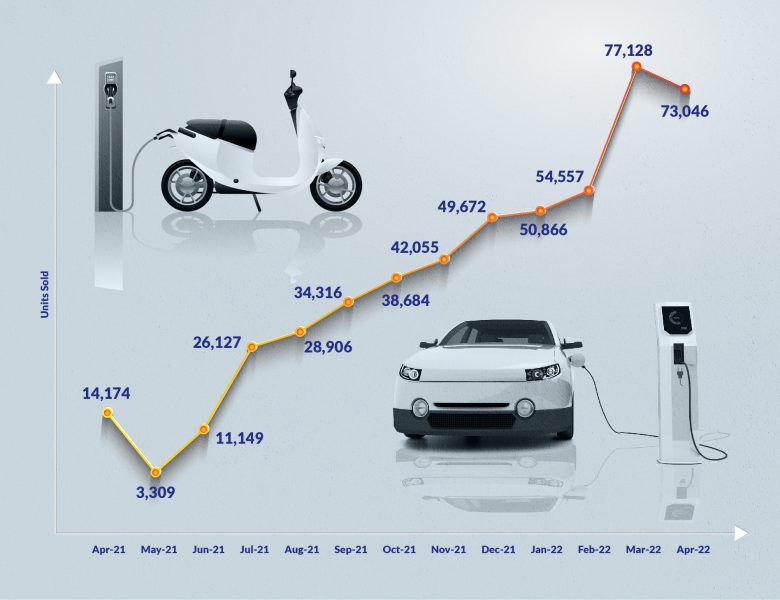
Uttar Pradesh topped the list of EV share with 16% of overall sales, followed by Karnataka 13%, Maharashtra 11%, Gujarat 10%, Tamil Nadu 8%, Rajasthan 7% and Delhi and Kerala 5%, as per a report by JMK Research.
In a surprise trend, electric scooters are seeing greater demand in tier 2 and 3 cities against tier 1 cities and metros. Despite perceived charging infrastructure challenges, the smaller cities are lapping up E2Ws. This is good news for E2W makers, as it could substantially expand their potential market.
The top three E2W consuming states saw towns with sub-million population accounting for the majority of sales — 56% in Maharashtra, 75% in Karnataka and 78% in Tamil Nadu — said a Business Standard report, citing data from the Council on Energy, Environment and Water (CEEW).
Chip woes and safety concerns
In March, four electric scooters were reported to have caught fire, including those made by Okinawa and Ola Electric, from different places in the country, prompting the government to order a forensic investigation. There were deaths in Vellore and Vijayawada due to EV fires. In April, a consignment of Jitedra EV e-scooters caught fire during transit near Pune. All the accidents are being probed.
While the fires appear more immediate, EV makers cite supply chain concerns over components, especially chips, as a major deterrant to growth.
“The recent happenings of fire incidents is an awakening call for the industry and we believe that even the best of the companies should introspect and constantly improve their designs and quality to repose confidence in the electric mobility that is going through such a robust growth path,” said Sohinder Gill, CEO, Hero Electric, as quoted by media reports.
Also read: India is vrooming down the EV lane; here are 8 takeaways
Pointing to the chip shortage problem, he said: “It’s like putting an emergency brake on a fast-moving train. Our sales were almost doubling month on month and we somehow managed with sourcing from different geographies but the war collapsed a major supply chain resulting in this disruption.”
Category-wise sales of EVs (April 2022)
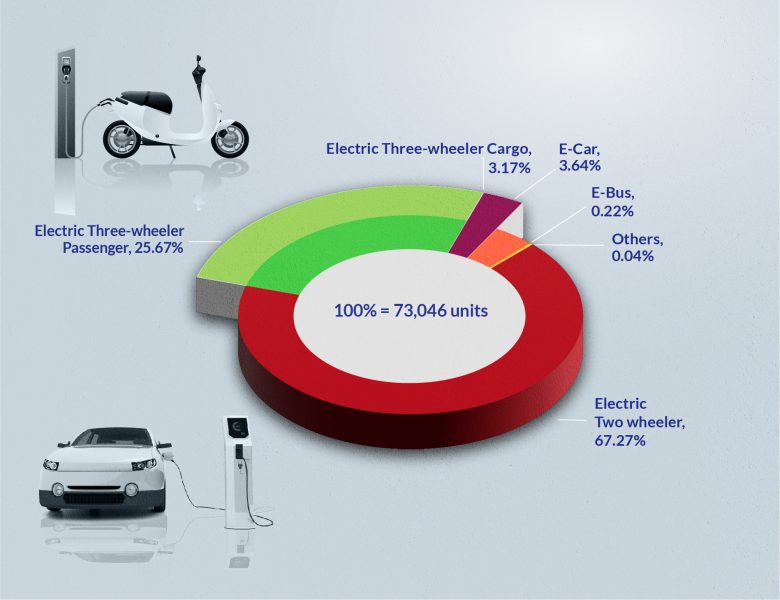
TVS, too, was hit by semiconductor shortage and is working with alternative sources to improve supplies.
Industry analysts feel the recent fire incidents could affect the growing market, causing concern among new users who might become more wary of buying EVs. The way out could be information transparency by both the government and the industry. The government should place on the public domain the reason for each of the fire incident, and penalise the manufacturer, a BusinessLine report said, quoting Rishabh Jain, Programme Lead, CEEW-CEF.
Also read: Why electric scooters could catch fire, and how you can avoid that
A revamp of the battery testing and certification mechanism, followed by an awareness campaign by OEMs and government bodies would help, he added.
Electric 2-wheeler sales (April 2021 – April 2022)

Not a long-term issue: Crisil
While the fires raise concern, credit rating agency Crisil feels the impact may be short term. “It may have a near-term impact which is a little negative but over the long-term, I don’t think this is going to be an impediment (in EV sales). This is a new age industry and any such industry will find teething issues,” said Hemal Thakkar, Director at Crisil, at a webinar.
Noting that the Indian EV industry has 25-30 companies as against 7-8 that operate globally, he said the industry will go through a learning curve and will take some time to attain maturity.
E-car sales by company (April 2021- April 2022)
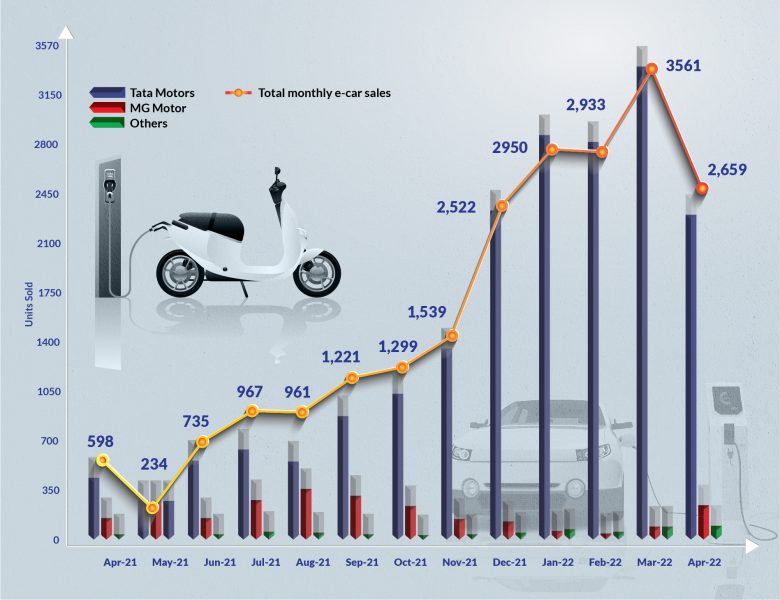
Union Minister of Road, Transport & Highways Nitin Gadkari has asked the manufacturers to recall defective vehicles. The transport secretary has said that the government will conduct a probe into the fire catching incidents of electric vehicles.
Specialist hires zooming
If the hirings are an indicator, the EV sector is all set for accelerated growth. Several EV companies have increased hiring, with a focus on specialists with deep technical knowledge. The aim, obviously, is to fix the issue of vehicle fires and other technical problems while also rolling out safer, better models.
Much of the demand for talent is in the mid- and senior-level categories, with annual salary levels going up to Rs 1 crore, according to an Economic Times report. There are around 1,000 jobs up for grabs, said the report.
Engineers specialised in the relatively new discipline of mechatronics, a combination of research, design, development and machinery maintenance involving both electronic and computer control systems, are in high demand. Some companies are said to be looking for PhD holders for their deep specialist knowledge and expertise.
Electric 2-wheeler sales by company (April 2021- April 2022)
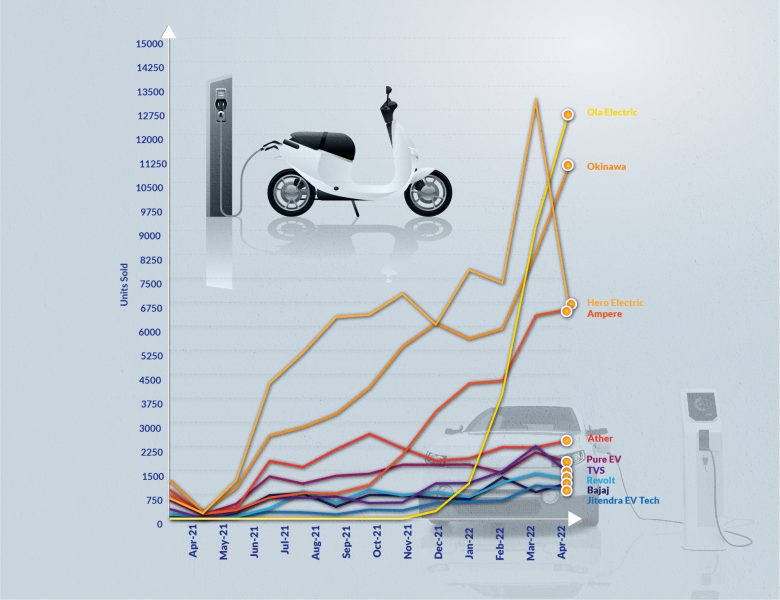
“Most of the leading EV industry players are fishing for specialised skills and hiring for manufacturing, engineering, sales, service and R&D roles. In fact, there is a shortage of talent in these functions and companies are ready to pay handsome amounts to onboard employees,” said Gill of Hero Electric.
Hiring in the operation/production and sales support spheres is significantly up due to enhanced safety processes, the report said, quoting Manu Saigal, Director-General, Staffing, Adecco India.
“Looking at the current demand and projections by EV companies, the expansion of headcount will continue at an even faster pace in the near future,” Alok Kumar, senior director of Manpower, which is part of ManpowerGroup India, was quoted as saying in the ET report. He noted that companies would have an increased focus on hiring for R&D and safety compliances to be better able to iron out safety issues.
State-wise sales of e-vehicles (April 2022)
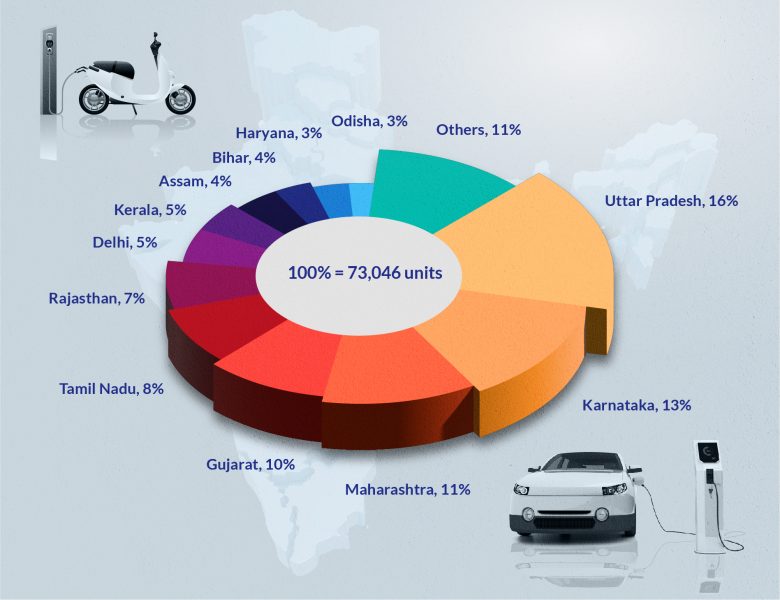
EV startup Evify is expanding the operations team, with a focus on technology installation, develop a full-stack dashboard, and deploying 200 vehicles in the first few months.
What the future beholds
Going forward, in addition to the fire incidents, the high cost of ownership and relatively low number of charging stations beyond cities will remain challenges for the EV industry, especially in the rural areas. On the other hand, high fuel prices, subsidies under the FAME-II (Faster Adoption and Manufacturing of (Hybrid and) Electric Vehicles in India) scheme and incentives rolled out by state governments are expected to improve demand.
The government in January said that the EV charging infrastructure has seen a 2.5 times increase in 9 mega cities – Surat, Pune, Ahmedabad, Bangalore, Hyderabad, Delhi, Kolkata, Mumbai and Chennai – in the last four months.
Between October 2021 and January 2022, 678 public EV charging stations were installed in these 9 cities, which was about 2.5 times of the earlier numbers, during the same period.
(All graphics sourced from JMK Research & Analytics)

